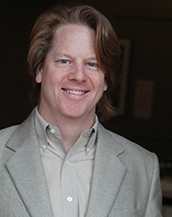Starry Nights: English Professor is a Shining Star in Environmental Literature Realm
Office of the Provost
Paul Bogard has stared into the night sky from different parts of the U.S. as he taught everywhere from New Mexico, Nevada, Wisconsin and North Carolina before settling in Virginia. However, no matter where Paul looked, one thing remained true: artificial light was interfering with the view.
Paul Bogard, a native Minnesotan, is an assistant professor of English at JMU, teaching creative nonfiction writing and environmental literature. He recently published The End of Night: Searching for Natural Darkness in an Age of Artificial Light. Bogard’s novel focuses on the negative impact of artificial light and the human experience. He points out that “for most of human history, the experience of stepping outside to come face to face with the universe at night was one of the most common human experiences, but now it has become one of the most rare.” Instead, he says, people seek out light and have come to associate it with a false sense of safety and security.
Not only has artificial light affected the human experience, the book interconnects our health and the health of our ecosystem in regards to artificial light as threatening “our physical health by disrupting our sleep, confusing our circadian rhythms and impeding the production of the hormone melatonin. In addition, our light pollution endangers the ecosystems on which we rely on by destroying the darkness that is habitat for 60% of invertebrate species and 30% of vertebrate species, all of which are nocturnal.”
Bogard’s work has been well received by critics, described as “a lyrical, far-reaching book. Part elegy, part call to arms, The End of Night feels like an essential addition to the literature of nature” by the Boston Globe. Bogard’s hope is to make JMU community aware of the darkness and to embrace it; he believes “we have a wonderful opportunity to change this situation by becoming aware of the value of darkness and the costs of light pollution, and from there beginning to change the way we use light at night.” He believes the JMU community can emerge as leaders in addressing the problem.
Bogard’s next novel will also be a part of the environmental literature genre, as he has already begun researching national parks, new mapping technologies and bird dogs.

